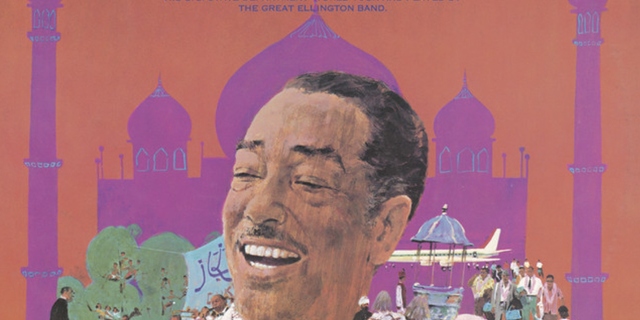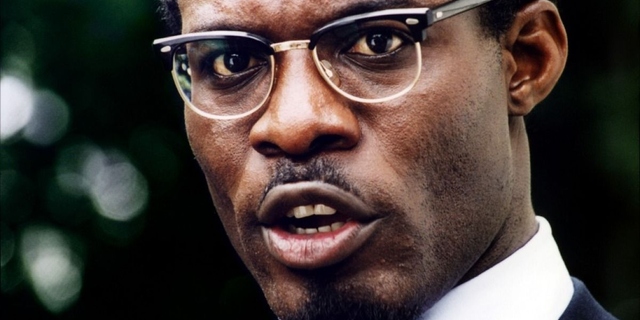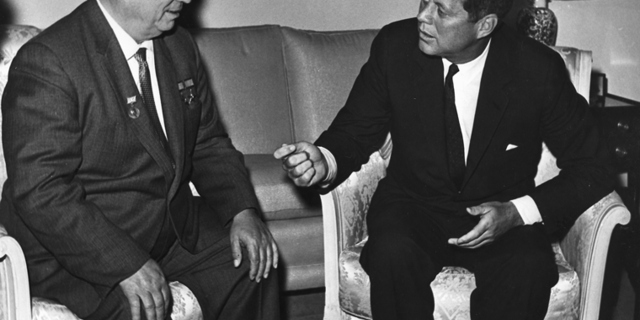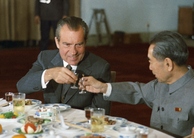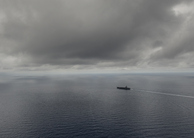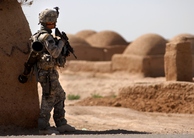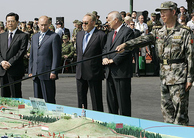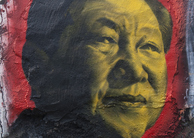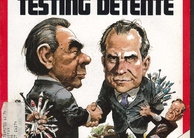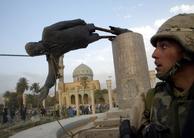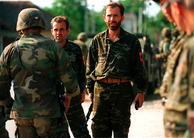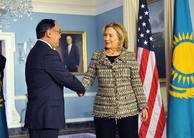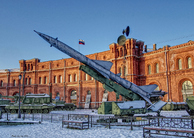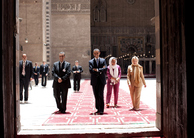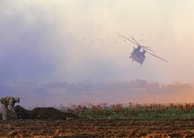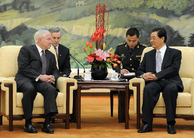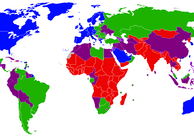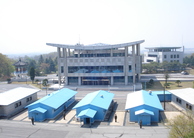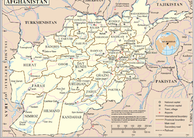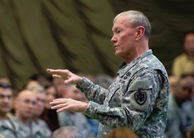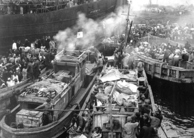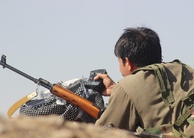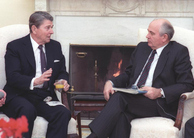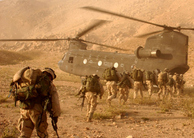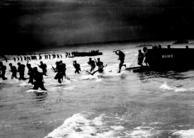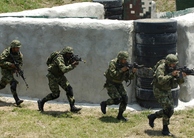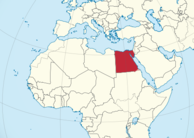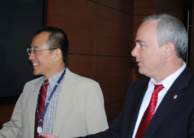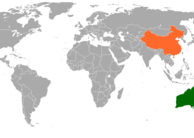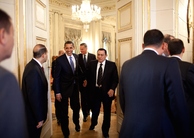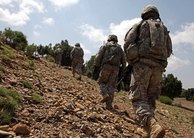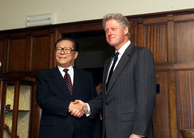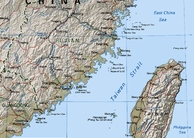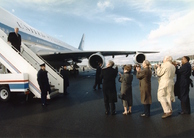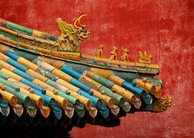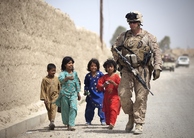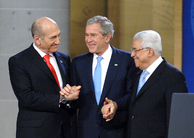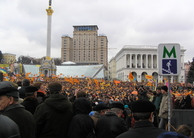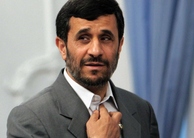|
Foreign Policy (tagged articles)
The keyword Foreign Policy is tagged in the following 60 articles.
2021, Vol. 13 No. 05
During the height of the Cold War, the US State Department sponsored a series of racially integrated “Jazz Ambassador” tours in order to project proof of American talent and egalitarianism abroad. Representing and wielding the cultural... Read Article »
2019, Vol. 11 No. 10
This article aims to present the biopiracy of traditional knowledge from India by the United States, which has occurred directly through the use of patent law and indirectly through economic power and cultural imperialism. Throughout this essay,... Read Article »
2017, Vol. 11 No. 1
As with much of the African continent, the Congo endured a harsh colonial past. What trailed, after its 1960 independence from Belgium, also followed a similar trend of its continental neighbors – continued foreign meddling. At the outset,... Read Article »
2017, Vol. 9 No. 10
The United States government started exploring the soft power potential of student and scholar exchange programs as early as 1908, with the establishment of the Boxer Indemnity Scholarship Program.[1] The father of the theory of soft power, Joseph... Read Article »
2017, Vol. 9 No. 03
In October of 1962, the United States and Soviet Union’s arms race in ballistic missiles escalated to an unnerving confrontation that lasted thirteen days, while both world leaders waited on opposite sides of the world for the other to say... Read Article »
2016, Vol. 7 No. 1
This paper investigates the influence of U.S. Foreign Policymakers' perceptions towards China on policy formulation during the Cold War. The influence of perceptions, especially perceptions surrounding the ideology of combatant states, is especially... Read Article »
2016, Vol. 7 No. 1
Foreign Policymakers, academics, and regional pundits have all acknowledged the importance of the South China Sea. This region, rich in resources and trade, is the subject of intense territorial contest and is perpetually at risk for escalation... Read Article »
2016, Vol. 7 No. 1
The rise of modernized and efficient militaries competing for dominance against the United States' military has resulted in increased eruptions of conflict globally. A majority of decisions by the Joint Chiefs and EUCOM about long-term U.S. military... Read Article »
2016, Vol. 10 No. 1
Following the People's Republic of China's "Reform and Opening Up" (gaige kaifang) ushered in by Deng Xiaoping in 1978, China's participation in international organizations has dramatically increased.2 These organizations cover a range of issues... Read Article »
2016, Vol. 8 No. 10
China and the Chinese Communist Party (CCP) that leads it has historically limited itself in regards to projecting power and inserting itself into international disputes and affairs. With the exception of its involvement in the Korean War, most... Read Article »
2016, Vol. 2015/2016 No. 3
Détente is generally understood as a relaxation of international tension. However, there are many conceptions and characteristics of détente: superpower détente (such as ‘Nixinger's, Leonid Brezhnev's or Mao Zedong/ Zhou... Read Article »
2016, Vol. 6 No. 2
The efficacy of efforts by the United States government to influence regime change in foreign nations has been increasingly called into question. Motivated by these statements of skepticism, the study herein provides a statistical analysis of the... Read Article »
2015, Vol. 8 No. 2
This paper discusses Allen Buchanan’s proposed shift in intervention found in his essay, “The Ethics of Revolution and its Implication for the Ethics of Intervention,” and posits that it successfully calls into question other... Read Article »
2015, Vol. 8 No. 2
America’s record of engagement in Central Asia[i] has been extensive during its post-9/11 era of adventurism. Between its vast military infrastructure and its explosive expansion of new commercial and security networks, the US has invested... Read Article »
2015, Vol. 8 No. 2
What I want to do today is answer one really big question. If we have time maybe we’ll get to the second question, but I want to answer one big question, because that’s what we should do as academics. It comes from an experience I... Read Article »
2015, Vol. 7 No. 02
For a country approximately the size of New Jersey, Israel certainly garners its share of widespread international attention. It is scrutinized, dissected, and more often than not, demonized under the microscope of the global media. In spite of... Read Article »
2015, Vol. 2014/2015 No. 1
British troops will be winding up their operations in Afghanistan by the end of next year. There may be other specialised things British troops will do thereafter, depending on what happens in Afghanistan from 2015. But sustained ‘combat operations... Read Article »
2014, Vol. 8 No. 1
The formation and expansion of the U.S. Africa Command (USAFRICOM) signals the increasing strategic importance of Africa to U.S. security interests, especially in light of the 2014 U.S.-Africa Leaders Summit on strategic relations. USAFRICOM is... Read Article »
2014, Vol. 6 No. 10
Is China building a harmonious world? In order to answer this question, it is necessary go beyond simply reviewing the official narrative of the 'harmonious world' policy and instead consider it in relation to China's international and domestic... Read Article »
2014, Vol. 4 No. 2
This paper investigates factors that contribute to the effectiveness of international economic sanctions. A review of existing literature on sanctions reveals that scholars of economic statecraft have largely neglected to consider two variables &... Read Article »
2014, Vol. 7 No. 2
Freeman writes that global governance in this period has been characterized by the United States’ inability to form a ‘grand strategy’ as it did in the post-WWII period to cope with the multitude of issues in the world today (2011... Read Article »
2014, Vol. 7 No. 2
The balance of terror created by the presence of weapons of mass destruction (WMDs) on the Korean peninsula has escalated the sense of uncertainty in East Asia, jeopardizing both the region’s security and progress towards political and economic... Read Article »
2014, Vol. 6 No. 04
After 35 years of war in Afghanistan[1], the year 2014 brings two milestones capable of major impact on the future – for better or worse. Firstly, the presidential elections that took place in early April, so far reported to be relatively... Read Article »
2013, Vol. 4 No. 1
This paper identifies and provides an initial analysis of the problem of mismatched theories in peacebuilding programs. This problem occurs when a project is developed by a group that subscribes to one theory of peacebuilding, but is then executed... Read Article »
2013, Vol. 7 No. 1
The current state of European strategic cooperation is optimistically described as "splintered" and pessimistically labeled as "nonexistent" by politicians and pundits alike. A potential retreat of the EU to staunch intergovernmentalism frustrates... Read Article »
2013, Vol. 5 No. 10
This paper analyzes state refugee policies through the lenses of Foreign Policy behavior and policy linkage. The case studies compare variations in Chinese state policies towards refugees from North Korea, Myanmar, and Vietnam. Through an additional... Read Article »
2013, Vol. 5 No. 09
Islam has been under siege since 2001 and in today's political environment, Muslims are too often associated with terrorism. The heinous attacks of 9/11 were treated by the U.S. not as crimes – which would require criminal prosecution and... Read Article »
2013, Vol. 6 No. 2
"In addition to the disturbing influence of racial friction, the nationalist movement in Africa is further harassed by the machinations of international Communism, forever seeking to turn fluid situations to advantage for the Communist bloc." &ndash... Read Article »
2012, Vol. 2 No. 1
The last decade of American military policy has been dedicated to fighting an enigma – how to wage war against an enemy that does not think, act, or fight like we do; an enemy that wears no uniform, utilizes any tactic, and swears its allegiance... Read Article »
2012, Vol. 6 No. 1
Myanmar, sitting on the border between South and Southeast Asia, reflects a historically oppressive state with internal struggle as surrounding countries compete for influence. In 1990, the government promised multi-party elections only to ignore... Read Article »
2012, Vol. 1 No. 1
In response to a growing acknowledgement of the failure of international aid, one school of scholars has identified a lack of aid as the defining crisis in development. From their perspective, aid has failed in driving change not due to inherent... Read Article »
2012, Vol. 5 No. 2
Evan Thomas's recent book, The War Lovers, chronicles the "monumental turning point" of the U.S. declaration of war against Spain in 1898, and the small circle of men who pressed for war, and for an American empire. The central figures, for Thomas... Read Article »
2011, Vol. 5 No. 1
When should the United States intervene militarily in weak countries? This is a topic of pressing international concern because the United States keeps intervening in weak countries. We are currently involved indirectly in Libya and very deeply... Read Article »
2011, Vol. 5 No. 1
In 2001, German President Johannes Rau made a statement that divided Germany. In an interview with a television station, Rau said that although he is “pleased and grateful” to be German, he cannot be “proud” of it–&... Read Article »
2011, Vol. 5 No. 1
As of September 2011, the United States was involved, at different levels, in military operations in Afghanistan, Iraq, Libya, Yemen and Somalia. America has more than 700 military installations overseas , and its military expenses account for almost... Read Article »
2011, Vol. 5 No. 1
The US has increasingly turned to using the military to administer humanitarian aid in recent years. This process has come under attack from many academics and foreign officials. Using action in Colombia from 1999 to present as a case study, this... Read Article »
2011, Vol. 3 No. 09
In the era since the removal of the monarchy in Egypt, a distance seems to have developed between the Egyptian people and the African aspect of their identity. This kind of sentiment has also been corroborated by Egypt’s elite such as Isma... Read Article »
2011, Vol. 4 No. 2
This essay seeks to elucidate the puzzle of China's policy decision to create a Sovereign Wealth Fund (SWF). Much literature has been put forth on the topic to predict the strategic benefits China may be pursuing through its investments in American... Read Article »
2010, Vol. 2 No. 12
John Howard, then-Prime Minister of Australia, claimed that, ‘I count it as one of the great successes of this country’s foreign relations that we have simultaneously been able to strengthen our long-standing ties with the United States... Read Article »
2010, Vol. 4 No. 1
Stephen M. Walt, professor of international affairs at Harvard University’s John F. Kennedy School of Government, spoke at Cornell on September 16, 2010, at the invitation of the Einaudi Center for International Studies. The following article... Read Article »
2010, Vol. 4 No. 1
James Goldgeier is professor of political science and international affairs at George Washington University and a 2010-2011 senior fellow at the Transatlantic Academy in Washington, D.C. He taught at Cornell from January 1991 to December 1993. His... Read Article »
2010, Vol. 4 No. 1
This analysis of U.S.-China relations was motivated by what I perceived to be misplaced "controversy" over Obama's China visit in autumn 2009 and his subsequent policy initiatives, which despite all of the public scorn are really no different from... Read Article »
2010, Vol. 2 No. 07
The United States presidency is a complex role, encompassing both domestic and Foreign Policy responsibilities. As a major world power, the United States has a large role in the realm of Foreign Policy, and it is the duty of the president to assume... Read Article »
2010, Vol. 2 No. 06
In 2005, during a period of heightened tensions between China and Taiwan and with the United States deeply embroiled in two major wars in Iraq and Afghanistan, the leading authority on East Asian security within the National Security Council nevertheless... Read Article »
2010, Vol. 2 No. 05
Power is the ability to achieve one’s purposes or goals.[1] Through the scholarship of Joseph Nye, the concept of power occupies two distinct spheres: ‘hard’ and ‘soft’. The former purports to have a coercive function... Read Article »
2010, Vol. 2 No. 04
The year 1993 was not a good one for Bill Clinton. An exception, perhaps, being the morning of January 20th when he stood at the west front of the United States Capitol building and took the Oath of Office to become the forty- second President of... Read Article »
2010, Vol. 2 No. 01
Since 1989, when economist John Williamson first conceived of the economic and policy recommendations known as the Washington Consensus (Williamson, 1989), this Consensus became generally accepted as the most effective model by which developing... Read Article »
2010, Vol. 2 No. 01
From before its birth to the present, the expansion of US power has been analogous to an ever-expanding hand upon the globe. Despite some of today's historically inaccurate politicians citing a revered past of non-interventionism and isolationism... Read Article »
2010, Vol. 2 No. 01
In the immediate aftermath of September 11th, the reaction of the French media was one of passionate empathy. The September 12th headline of Le Monde reads simply “Nous sommes tous Américains” (We are all Americans).[1] Yet as... Read Article »
2009, Vol. 3 No. 1
Over the two decades of post-Soviet history of modern Russia, its Foreign Policy has gone through several distinct periods and long-term trends. The periodization of the new Russia’s Foreign Policy includes a “romantic” or &ldquo... Read Article »
2009, Vol. 1 No. 10
Nearly eight years into the war, the security situation in Afghanistan appears to be deteriorating at an increasingly fast past. Areas that were previously secured have been retaken by militants; significant increases in civilian casualties, caused... Read Article »
2009, Vol. 2 No. 2
Is America really in decline as a global superpower? We examine current arguments for America's economic decline and argue that a purely economic analysis is insufficient for evaluating a country's status as a global superpower. Our comprehensive... Read Article »
2009, Vol. 2 No. 2
Ambassador Einaudi spoke at Cornell at the invitation of the Mario Einaudi Center for International Studies to commemorate the 20th anniversary of the Luigi Einaudi Chair in European and International Studies named after his grand-father. The Board... Read Article »
2009, Vol. 2 No. 2
This ongoing dispute clearly concerns the United States, the long-term third party in peace negotiations, and a close ally of Israel. However, now more than ever European and Middle Eastern states are invested in the resolution of this conflict.... Read Article »
2009, Vol. 2 No. 2
The responsibility of Georgian President Michael Saakashvili for the war with Russia continued to be hotly debated in Georgia, Russia and the world several months after its end.1 Indeed, there are various views about Saakashvili's decision to attack... Read Article »
2008, Vol. 1 No. 2
In recent years the United States has undertaken daunting activities in fighting two overarching wars against intangible enemies across many borders. The war on drugs and the war on terror have severed many national ties, even as globalization continues... Read Article »
2008, Vol. 1 No. 2
U.S. Foreign Policy exemplifies a broad Wilsonian consensus about the value of democracy promotion. The “forward strategy of freedom,” for example, has been the cornerstone of the Bush administration’s geopolitics, but it was not... Read Article »
2007, Vol. 1 No. 1
Fifteen years ago, the collapse of the bipolar world overwhelmed the installed world order. The USA became the only superpower standing and leading the world organization. They have now to deal with emerging countries such as China and India. On... Read Article »
2007, Vol. 1 No. 1
In recent years, the turbulent nature of politics in the Middle East has captured the attention of nations worldwide. Iran, in particular, has garnered more than just alarmed glances due to its aggressive Foreign Policy against the US, as evident... Read Article »
2007, Vol. 1 No. 1
China’s emergence as a key player in Africa, the impact of its presence and its challenges to traditional Western pre-eminence in African economies are among the hallmarks of the changing economic scenario in the twenty-first century. Beijing... Read Article »
Expedited Article Review
Submit an article and get a decision fast.
If you need a fast decision, INQUIRIES Journal offers expedited processing of your submission for a small fee. Depending on the expedited review option you choose, you can receive a decision in as few as 5-days.
In addition to a shorter review period, the fee supports the journal's continued operation and open-access publishing model. Standard submissions are always free. Submit Now » - Submit an Article to Inquiries Journal -
|

